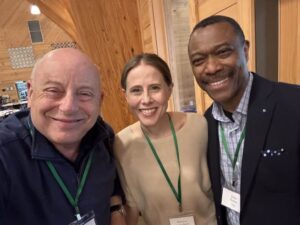 “We have to say something.” I heard this a few times in the early days the week-long spring meeting of the House of Bishops at Camp McDowell, outside Birmingham, Alabama, which ended Monday.
“We have to say something.” I heard this a few times in the early days the week-long spring meeting of the House of Bishops at Camp McDowell, outside Birmingham, Alabama, which ended Monday.
Of course we do. No presidential administration in American history, with the exception of Jefferson Davis’s in the Confederate States of America, has so explicitly repudiated the values of liberty and justice for all. For us Episcopalians, the baptismal covenant, in which we promise to respect the dignity of every human being, is in the crosshairs of Trumpism. His campaign and regime have scapegoated and reviled trans people and millions of hardworking immigrant workers, slandered Haitians with a modern-day blood libel, tried to erase Black history, devastated refugee resettlement programs, scaled back and threatened to terminate the PEPFAR program that saved tens of millions of lives in Africa, given Israel a green light for violating ceasefire terms and waging more devastating attacks on Gaza, and shattered friendships with allies all over the world.
“We have to say something” — because, we thought, people in our dioceses would want to know bishops’ mind on the events of the day. But the question was which events and which day. Shown here with the Rt. Rev. John T. W. Harmon of Arkansas and me, Rebecca Linder Blachly is a former State Department policy advisor who heads The Episcopal Church’s government relations office. During our meeting, she spent over an hour surveying the breadth and depth of Trump’s assault on human dignity and vowed to keep on top of it all as best she could. She was visibly moved as we gave her a standing ovation.
But there’s simply too much for one brilliant policy expert, one church, one House of Bishops. One of Trump’s ex-cons, Steve Bannon, called the brutal weeks since Jan. 20 shock and awe, days of thunder, and flooding the zone. One executive order after another about matters Trump dimly understands. A vengeful incompetent, Trump is the sharp end of the stick in an assault by a wonk squad which is determined to stop the forces of pluralism and internationalism by building a wall of authoritarian power around the White House and making democracy pay for it.
They’re gambling with their own futures as well as everyone else’s. Trump has already acquiesced in the use of violence to try to keep power illegally. He pardoned a small army of violent felons, some of whom attacked and injured police officers. If he proves equally accommodating should his mobs attack federal judges or demonstrators, the peaceful bonds of our civil society could deteriorate to the point where everyone was out in the cold, conservatives, moderates, and progressives alike, with the last best hope of earth dying like a candle in a blizzard.
So “we have to say something.” But for now, not in the form of bishops’ statements or resolutions. As the week went on in Alabama, there was less buzz about trying to speak to the church or nation. Notwithstanding the amount of time we spend writing and arguing about resolutions, it is widely understood that neither Trump nor Netanyahu reads them. Presiding Bishop Sean Rowe says he believes the church should speak out when it can make a difference. Imagine a resolution offering concrete support to grassroots faith-based peacemakers instead of one demanding that political leaders make peace.
TEC resolutions and statements will no doubt persist as long as TEC. Some bishops may have still wished we’d figured out how to offer a word to the church at the end of our meeting. But as a matter of fact, we have, in the form of three vital recent texts. If I had $300,000, I’d run them as full page ads in The New York Times as all the news that’s fit to print about what our church stands for in these dark days.
In her Washington National Cathedral prayer service sermon, my HOB table mate the Rt. Rev. Mariann Edgar Budde pleaded with Trump to be compassionate toward those most threatened by his campaign promises. At his enthronement service, Bishop Rowe said the work of the church was welcoming and centering the marginalized.
And during a magnificent speech on Christian nationalism during our meeting, the Rt. Rev. Robert C Wright of Atlanta invoked the story of David and Goliath, with our church and its ecumenical partners in the role of the brave boy with his five smooth stones. He called on us to “temper candor with kindness,” taking care not to match malice with malice. It is not Rob’s observation, but mine, that we can be blunt about Trump, and in my view must be, without laying his sins at the feet of tens of millions of fellow Americans who voted for him.
Bishop Wright’s five stones are not for throwing but for discernment and study: Clarity of communication about public policy when God’s purposes are being flaunted, an audacious faith, Christian leadership, bravery formation in the face of mounting risk, and gentle boldness. “Giants become manageable when we focus on the magnitude of God,” he said, adding a quote from David: “Let no one’s heart fear on account of this Philistine.” When this text becomes available, it will launch a thousand Bible studies. Thus will we continue to find our voices.
